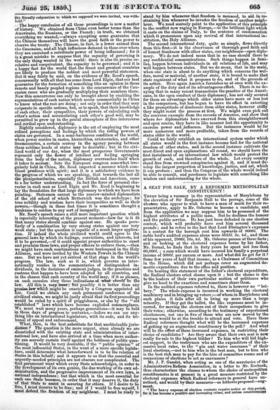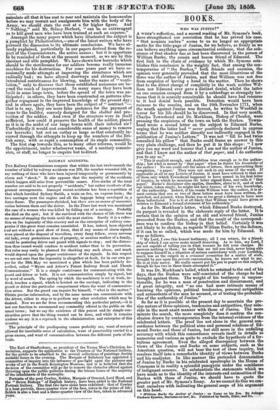SEAT FOR SALE, BY A REFORMED METROPOLITAN CONSTITUENCY I
ZBEERE being a vacancy in the representation of Marylebone by the elevation of Sir Benjamin Hall to the peerage, some of the eleetors who appear to wish to have a man of mark for their re- presentative, apply to Mr. Osborne to become a candidate, and from the application we may suppose him to be possessed of the highest attributes of a public man. But he declines the honour and the public service. He has just been defeated in one election contest, which will probably have cost him several thousand pounds ; and he refers to the fact that Lord Ebrington's expenses in a contest for the borough cost him upwards of 60001. The noble lord's audited expenses alone were 5635/. 38. 4d., and those of his opponent, 29861. 10s. 4d. Mr. Osborne pauses at these facts ; and on looking at the electoral expenses borne by his father, Mr. Bernal, he finds that in forty years he spent not less than 60,000!.; a sum which would have secured his family a perpetual income of 3000/. per annum or more. And what did he get for it ? Some few years of half that income as a Chairman of Committees in the House which did not perhaps cover an augmented do- mestic expenditure due to the office and position. • On hearing this statement of the father's electoral expenditure, the Radical electors cried shame upon it ' • but the shame is due to the leaders of their own particular section of politicans who give no heed to the exactions and sometimes share them. In the audited expenses referred to, there is however no "bri- bery." The whole expense is incurred in working the electoral machinery and in bringing up voters ;—of whom in Marylebone and such places it fails after all to bring up more than a large minority. If they get the ballot, the hke expenses must be in- curred, for moving the electors out of their occupations to give their votes; otherwise, according to the testimony of experienced. electioneers, not one in five of those who are now moved by the canvass would be at the trouble to attend and vote. Have these Radical reformers thought what will be the increased expenses of getting up an augmented constituency to the poll ? And what will be the effect of those increased expenses, in restricting their choice of candidates ? Are they aware that their own seat is now really for sale to the highest bidder ? To him who will bid high- est support, to the vestrymen who are the expenditors of the ex- cessivelocal rates, to the "gin and water concusses" of their local elections,—not to him who is the best man, but to him who is the best rich man to pay for the hire of committee rooms and of connexions of elections to act as canvassers ?
Mr. J. P. Gassiot, when acting as one of the secretaries of the Administrative Reform Association, in a letter to Mr. Roebuck, thus characterizes the classes to whom the choice of metropolitan constituencies is at present in a great measure restricted by the electoral expenses which Radical reformers in general have un- noticed, and would by their measures—as hitherto proposed—aug- ment.
"The heavy expense of election contests require notice at this period, for it has become a positive and increasing crime, and unless constituencies calculate all that it has cost to rear and maintain the homunculus before we may recruit and amalgamate him with the body of the Army, we should state the cost at a far higher figure. And ." Nothing," said Mr. Sidney Herbert, "can be so extravagant as to kill good men who have been trained at such an expense."
Amongst the many papers which have illustrated the subject is a pamphlet by Philostratiotes,—one of the latest writers who have pursued the discussion to its ultimate conclusions. We have al- ready explained, particularly in our papers derived from the re- port of the Commissioners, the active causes ; but it is opportune to be reminded of them at the present moment, as we are by this succinct and able pamphlet. We have shown how barracks which should be the storehouses for our soldiers become really immense machines for his destruction. For some years past we have oc- aasionally made attempts at improving the structures which are radically bad ; we have altered doorways and chimneys, have introduced contrivances for blowing, under the name of venti- lation," only to discover that these established nuisances are be- yond the reach of improvement. In many cases they have been built in some large town, before the spread of the town was an- ticipated; in others, they have been constructed on patterns alto- gether repugnant to the improved knowledge of the present day; and in others again, they have been the subject of" contract "- that is to say, they are mere false pretences for the payment of sums to the builder, scarcely designed for the shelter and pro- tection of the soldier. And even if the structure were in itself sufficient, bow could it preserve the health of the soldier, placed as it is in the midst of our large towns with their infected air? Undoubtedly it would cost considerable sums of money to remove our barracks; but not an outlay so large as that constantly in- curred through the attempts to keep up the numbers of the Bri- tish army, with so rapid a consumption of its staple commodity.
The first step towards this, as to many other reforms would be the appointment, under whatsoever name, of a sanitar;, commis- sion, or staff, no longer to enquire but to direct.

























 Previous page
Previous page